Muslim councillor calls for dialogue with Islam
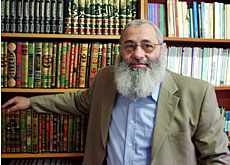
Hassan El Araby - the head of an Islamic cultural centre in Chiasso, and the border town’s newly elected councillor - is calling for more dialogue between the Swiss and Muslims living in Switzerland.
swissinfo talked to Switzerland’s first Muslim politician about ethnic tensions and Western perceptions of Islam.
El Araby gives visitors to the Islamic Cultural Centre a warm welcome. It is thanks to him that the centre has expanded to include a library and a prayer room, and that it’s become a focal point for the Islamic community even well beyond Chiasso.
But 50-year-old El Araby, who is of Egyptian origin, stresses that the centre is not just for Muslims.
“I want the local population to come into closer contact with Islam and see it in its true light, not in the way it is portrayed in the media.”
swissinfo: By electing you to the local council, the people of Chiasso have shown that they like and trust you. How do you feel about this?
Hassan El Araby: The truth is that we actually wanted to put forward someone young. And we thought that only someone who was born and raised here could be charged with bringing the local and the Islamic community closer – but in the end they picked me.
I was in contact with various political parties, but in the end I stood as an independent candidate.
Until now I’ve been working on the integration of Muslims. But now my role has changed, and I have to look after everything that’s related to Chiasso. It’s a big responsibility and I hope I’m up to it.
swissinfo: Do you see your election as a success?
H.E.A.: We are still a very small community, and we’re often faced with linguistic and integration problems, so it seems a bit premature to talk of success. But we’ve certainly made it clear that we want to play an active role in this country’s social life.
We’ve always been very much in favour of integration. Our communities are mixed: there are Algerians, Turks and Kosovars, as well as Swiss who have embraced Islam. That’s why we recently started using Italian for our internal communications and when we give counselling and deliver sermons.
That way, aside from the liturgy which is in Arabic, we always speak the language of the town. We’ve made a lot of efforts to teach the language to newcomers and this in turn has brought our people closer to the local residents.
swissinfo: Your work is concentrated in Ticino. What is the situation in other parts of the country?
H.E.A.: The Muslim presence in Switzerland is fairly recent, you can’t compare it to other big countries like France.
It’s only in the past ten years that immigration has increased and that communities have developed. Mosques and meeting places are gradually being set up and the League of Muslims in Switzerland was created in 1992.
But on a European level, Islam is becoming more organised thanks to the creation in 1998 of a new Council of [Islamic] experts, made up of over ten people living in Europe.
That doesn’t mean that there’ll be a European [branch of] Islam but it’s still an important move that will make a big difference to the faithful in Europe. Life as a Muslim in Switzerland isn’t the same as in Egypt or Saudi Arabia.
swissinfo: There are often tensions between Muslims and Westerners. Even in Switzerland there are those who would like to ban religious symbols such as headscarves from public places [as in France]. What do you think about this tendency?
H.E.A.: The events in France have nothing to do with symbols: it’s about taking away fundamental rights. Banning headscarves goes against the principle of religious tolerance.
I don’t really understand all these debates. Even at the time of Jesus Christ – bless his name – women wore headscarves. For me it’s clear that there is a growing fear of Islam.
swissinfo: But isn’t the principle of state secularism a legitimate one?
H.E.A.: Secularism is becoming a new religion: banning crucifixes, banning headscarves… The whole idea behind state secularism is that everyone should have the same rights. But if secularism restricts someone’s identity then it’s going against this principle.
The state shouldn’t take away the rights of any minority group. The Koran says: ‘You have your religion, I have mine’. I have to say that in Switzerland the majority of people still try to live by that.
swissinfo: Last month’s attacks on Madrid have given rise to fresh fears of violent attacks by Islamic fundamentalists and a fear of Islam in general…
H.E.A.: Violence is a growing problem within all sectors of society. The media is partly to blame for making people scared as it focuses on bloodshed.
It’s wrong to portray all Muslims as terrorists and all Muslim women as segregated [from society].
Prejudices are also being reinforced by all the news coming out of the Palestinian territories and Iraq. Muslims are being unfairly attacked there and yet no one speaks of the thousands of dead. The war is founded on a lie and is deeply unjust.
So why be surprised when the people revolt?
swissinfo: So what are your hopes for the future?
H.E.A.: That dialogue resumes: that’s the only way of promoting understanding. If the money that went towards fighting wars went into development aid, humanity would move forwards.
Too much injustice is being sown. The point of life is to obey God by doing good and by building, not by destroying.
The prophet Mohammed – bless his name – says: “Even on judgement day we are each given a seed that we can choose to sow. What’s the point in life if there’s no hope? What are we doing if we can’t look to the future?”
swissinfo-interview: Daniele Papacella (translation: Vanessa Mock)
1994: the League for Muslims of Switzerland is created.
1998: the Islamic Cultural Centre is set up in Chiasso.
There are 300,000 Muslims living in Switzerland.
Hassan El Araby was born in Egypt, where he graduated in business and economics, and has lived in Switzerland for 20 years.
He became Switzerland’s first Muslim local councillor in April when he was voted in as an independent member of the Chiasso council.
He became head of the Islamic Cultural Centre in 1999.

In compliance with the JTI standards
More: SWI swissinfo.ch certified by the Journalism Trust Initiative
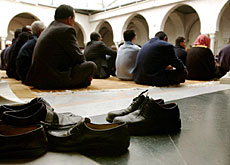
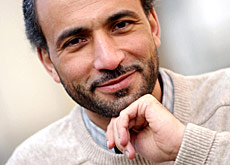
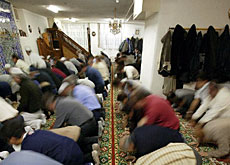
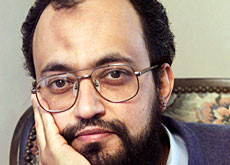
You can find an overview of ongoing debates with our journalists here. Please join us!
If you want to start a conversation about a topic raised in this article or want to report factual errors, email us at english@swissinfo.ch.